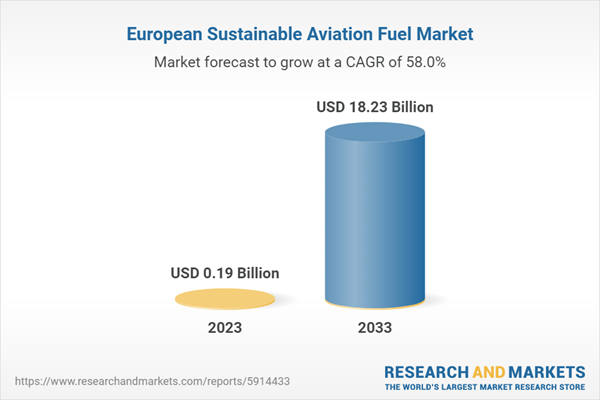Dublin, Feb. 26, 2024 (GLOBE NEWSWIRE) -- The "Europe Sustainable Aviation Fuel Market - Analysis and Forecast, 2023-2033" report has been added to ResearchAndMarkets.com's offering.
The Europe sustainable aviation fuel market was valued at $96.9 million in 2022 and is anticipated to reach $18.23 billion by 2033, witnessing a CAGR of 58.03% during the forecast period 2023-2033.
Due to the pressing need to lower greenhouse gas emissions and lessen the impact of aviation on climate change, the market for sustainable aviation fuel (SAF) has become an important and quickly expanding segment within the aviation industry. SAF, commonly referred to as biojet fuel, is produced using renewable energy sources, algae, and agricultural waste as sustainable feedstocks. It provides a competitive substitute for traditional jet fuel by cutting emissions of carbon dioxide and other pollutants to a great extent. Governments, airlines, and other industry players are putting more focus and capital into the SAF market as they work to meet their sustainability targets. The market for sustainable aviation fuel has enormous potential for innovation, teamwork, and good environmental impact. It has the ability to transform aviation and contribute to a more environmentally friendly future. 
Market Drivers and Challenges
The projected growth in jet fuel consumption in Europe could lead to a substantial increase in the demand for sustainable aviation fuel (SAF). This heightened demand would place additional pressure on the deployment of SAF production capacity within Europe.
The growth of sustainable aviation fuel (SAF) is constrained by a few factors, such as the maximum pace of deployment that refers to the rate at which SAF production facilities can be constructed, the availability of feedstocks such as biomass, municipal solid waste (MSW), and renewable power for green hydrogen production. In addition, current geopolitical tensions in the region and ongoing war-like conditions such as the Russia and Ukraine war, coupled with the impact of other external factors such as inflation, and supply chain complexities, are expected to have a negative impact on the market players who intend to expand their operations in the region.
Market Segmentation
Segmentation 1: by Application
- Commercial Aviation
- Business and General Aviation
- Military Aviation
- Unmanned Aerial Vehicle (UAV)
Segmentation 2: by Fuel Type
- Hydrogen Fuel
- Biofuel
- Power-to-Liquid Fuel
- Gas-to-Liquid Fuel
Segmentation 3: by Manufacturing Technology
- Fischer-Tropsch Synthetic Paraffinic Kerosene (FT-SPK)
- Hydroprocessed Esters and Fatty Acids-Synthetic Paraffinic Kerosene (HEFA-SPK)
- Alcohol-to-Jet Synthetic Paraffinic Kerosene (ATJ-SPK)
- Synthetic ISO-Paraffin from Fermented Hydroprocessed Sugar (HFS-SIP)
- Catalytic Hydrothermolysis Jet (CHJ)
Segmentation 4: by Country
- UK
- Germany
- France
- Rest-of-Europe
Key Market Players and Competition Synopsis
The companies that are profiled have been selected based on thorough secondary research, which includes analyzing company coverage, product portfolio, market penetration, and insights, which are gathered from primary experts. The key players operating and present in the Europe sustainable aviation fuel market include:
- Shell
- Neste
- SkyNRG
- Velocys plc
- TotalEnergies
Key Attributes
| Report Attribute | Details |
| No. of Pages | 103 |
| Forecast Period | 2023-2033 |
| Estimated Market Value (USD) in 2023 | $0.19 Billion |
| Forecasted Market Value (USD) by 2033 | $18.23 Billion |
| Compound Annual Growth Rate | 58.0% |
| Regions Covered | Europe |
Industry Outlook
- Sustainable Aviation Fuel Market: Overview
- Evolving Emission Control Measures in the Aviation Industry
- Emerging Zero Emissions Aircraft Technology
- Electric Propulsion Systems
- Hydrogen Fuel Cell Technology
- Advanced Aerodynamics and Lightweight Materials
- Urban Air Mobility (UAM) and Electric Vertical Take-Off and Landing (eVTOL)
- Current and Future Technological Trends
- Carbon Capture and Utilization (CCU) Technologies
- Direct Air Capture (DAC) Technologies
- Evolving Aviation Propulsion Technologies: Migration Toward Reduced Emissions
- Critical Success Parameters for Sustainable Aviation Fuel Adoption
Business Dynamics
- Business Drivers
- Increasing Environmental Concerns
- Volatile Jet Fuel Prices
- Advances in Conversion Technologies
- Business Challenges
- Infrastructure Development Cost
- Certification and Sustainability Criteria
- Inadequate Supply of Feedstock
- Business Opportunities
- SAF Offtake Agreements
- Business Strategies
- Market Developments
- Partnerships, Collaborations, Agreements, and Contracts
For more information about this report visit https://www.researchandmarkets.com/r/uxp3gs
About ResearchAndMarkets.com
ResearchAndMarkets.com is the world's leading source for international market research reports and market data. We provide you with the latest data on international and regional markets, key industries, the top companies, new products and the latest trends.
Attachment
